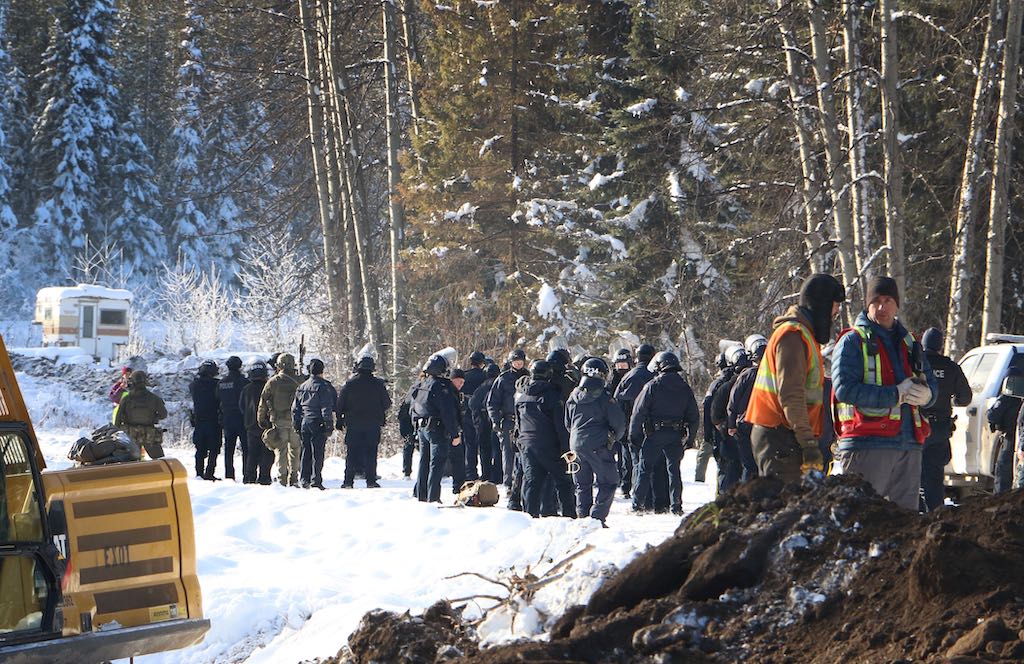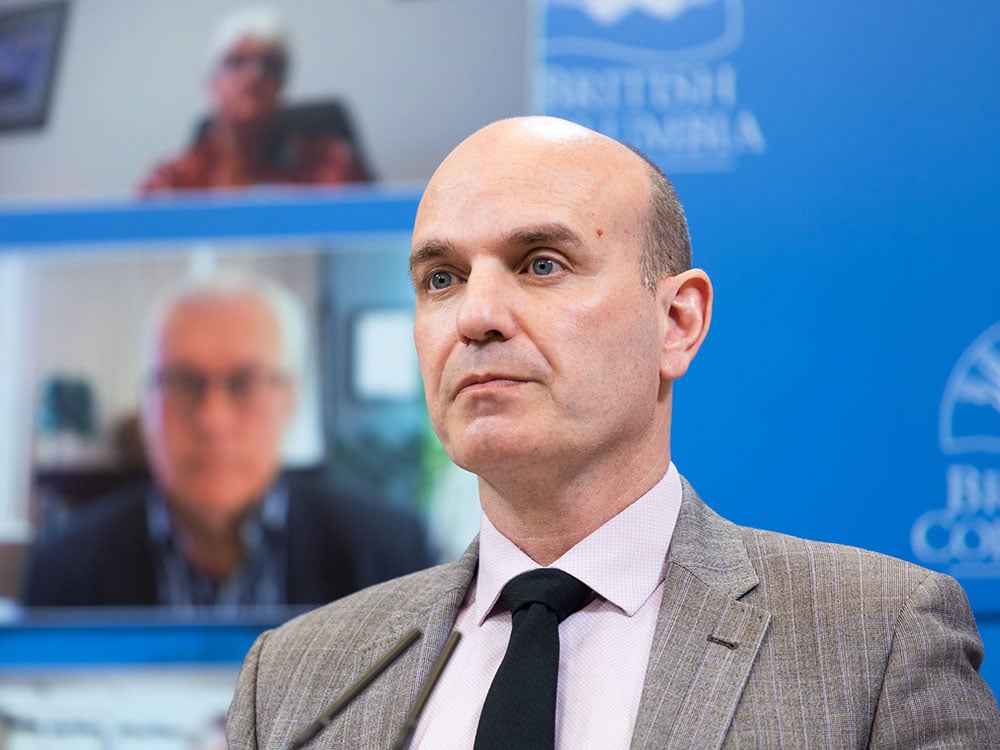In early December, I reached out to my MLA, Nathan Cullen, for an interview.
Two weeks earlier, RCMP had conducted its third raid in as many years on Wet’suwet’en territory. Thirty people were arrested at gunpoint, including two journalists who spent several days in police custody. Public response was swift and critical.
In the weeks that followed, the BC NDP government was notably silent.
Then Cullen, whose Stikine riding overlaps Wet’suwet’en territory in northwest B.C., wrote a letter to commissioner Brenda Lucki asking her to review “force used by members of the RCMP during the enforcement action addressing protests.” At the time Cullen faced mounting pressure from Gitxsan Hereditary Chiefs after disturbing video of a forceful RCMP arrest at a solidarity protest near railway tracks in Hazelton circulated online.
I requested a sit-down, in-person interview with Cullen, who is also B.C.’s municipal affairs minister, to better understand why he wrote the letter, his thoughts on the continued enforcement against Wet’suwet’en who oppose the Coastal GasLink pipeline and the status of negotiations over Wet’suwet’en land title.
Cullen has immense experience working with the communities in his riding. He was elected member of Parliament for Skeena-Bulkley Valley in 2004, a position he held for 15 years. In early 2020, during the intervening year between federal and provincial politics, he was hired as intermediary between government and the Wet’suwet’en Hereditary Chiefs as tensions on the Morice Forest Service Road threatened to reach a breaking point.
In May 2020, the provincial and federal governments entered into a Memorandum of Understanding with the Wet’suwet’en Hereditary Chiefs to resume land title negotiations left unresolved by the 1997 Delgamuukw-Gisday’wa court case, in which the Supreme Court of Canada acknowledged the nation’s title had never been extinguished.
But negotiations soon lapsed. As a condition of entering into the discussions, Wet’suwet’en Hereditary Chiefs demanded RCMP cease patrols of the remote Morice Forest Service Road and remove a detachment that was established on the yintah, or territory, in early 2019. Despite RCMP saying they would withdraw, that hasn’t happened. Instead, patrols have increased since Coastal GasLink reported an attack on a worksite in February. Work on the pipeline continues.
A summit proposed last fall between Wet’suwet’en, federal and provincial governments failed to materialize. Wet’suwet’en Hereditary Chief Na’Moks said the nation is planning a gathering in July and local politicians will be invited as guests, not key figures. He added that Chiefs are ready to resume meetings when RCMP leave the yintah.
Last week, I finally sat down with Cullen at his office in downtown Smithers. It was our first face-to-face interview in more than a decade, when the region faced another pipeline, Enbridge Northern Gateway, and Cullen was our MP, at the time considering a run for the federal NDP leadership (he entered the race, coming third behind Tom Mulcair).
In 2011, he’d told me, “Skeena sits right at the crossroads of our future. What kind of economy, what kind of environment are we going to have? How we are trying to tackle big problems here is something the whole nation can hear about.”
Last week, I asked him for an update. Our discussion has been edited for length and clarity.
How are we doing, tackling the big problems, 11 years later?
I still think, on the issues, we’re at the forefront. Just by where we live and the territories we’re on and the questions of carbon and climate and the impacts, that we feel it in a different way than the majority of Canadians who live in a city where all of those issues are there, but maybe not always as tangible.
I just came from a lunch where I just happened to bump into a bunch of Chiefs, and that’s just because you’re here. Whereas when I deal with a lot of folks down south, it’s not personal. They don’t necessarily know an Indigenous leader. When we say climate change impacts, we look up and think about forest fires and we think about floods. We think about those things in really practical terms.
So, I think Skeena, the northwest, by its nature, lives these things. And it’s also the place where, on something like Indigenous rights, much of the jurisprudence, much of the case law has come out of the region, whether it’s Delgamuukw or Haida or Tlingit.
How are we doing? From my perspective, it depends on which part of the region you’re talking about. We have an offer that was first made by the Wet’suwet’en to have a summit, to talk about rights and title within Wet’suwet’en territory, back in November. We agreed, we got the feds to say, yep, let’s sit down. It hasn’t happened.
But we’ve been very keen on that. Thirty years we’ve been waiting to resolve the fundamental questions about rights and title, decision-making on the yintah. We work with the Office of the Wet’suwet’en on some of the tables around the environment, and I think there’s progress made on water, fish, potential guardian programs, all that on-the-ground stuff. The fundamental legal questions and sorting out our co-governance models remain.
We signed an agreement with Tahltan last week, a very specific use of the Declaration on the Rights of Indigenous Peoples’ Act Section 7 around a mine, yet it’s the first one. That’s the Crown essentially pulling back and making the space for formal co-decision-making and co-management. So, it’s a long answer to your question, but it is a complex question because it depends on where and with who.
Where are we at with the Wet’suwet’en title negotiations that started two years ago?
I think the summit, as proposed by the Wet’suwet’en, was sort of a key reset piece. It’s a difficult road to walk in the sense that from the very beginning, at the Wet’suwet’en’s request, and Canada and B.C. agreed, that the pipeline and the title talks would remain separate — yet affecting one another, for sure. But it’s a discipline of trying to keep them separated. One is sort of the foundation, the profound underneath piece, of all that happens on the surface, whether it’s forestry or a pipeline or water or anything.
But in terms of general progress, we’ve been public, the minister’s been public, we’re not satisfied. We wanted to see more. The summit is not meant to solve everything, but my hope was that puts us in a reset or a relaunch of the efforts to dig into what’s always been the motivation from Delgamuukw, which is, what does governance look like within this yintah?
On the topic of Wet’suwet’en governance, the minister of Indigenous relations has referred to disunity within the nation as a reason for title talks not moving forward.
We get pressures, of course, from the Elected Chiefs, as you’ve seen, the Band Council Chiefs are quite vocal in opposing the approach that we’ve taken to this point, which is not exclusively but predominantly dealing with the Hereditary Chiefs over questions about the yintah. That concern remains from the Elected Chiefs.
One of the notions of the summit was to try to bring elected representatives into that conversation, as well, at the appropriate time for the appropriate conversations. I think at various points that there’s been an opening, you’d have to check with the Wet’suwet’en Chiefs as to whether that’s still true.
One of my preoccupations has been the durability of any agreement we come to. There’s been times in the past where the government has signed agreements that were maybe a little doubtful as to, on a governance level and the legal level, how solid they would be. Then they get challenged almost immediately in court by members of that same nation.
Delgamuukw and the memorandum of understanding both recognize the house groups, the traditional governance system, as the governing body for the Wet’suwet’en. The province has repeatedly pointed to the benefit agreements signed by Coastal GasLink with band councils as evidence of support, while somewhat dismissing the concerns of the Hereditary Chiefs, I would say. Does that not further drive that wedge of division?
I’m not sure that’s a fair characterization, in terms of “dismissing.” I mean, we put a lot of effort, a fair amount of money, in terms of Wet’suwet’en governance and offers of further support for Wet’suwet’en governance to do the work that the Wet’suwet’en want to do and say they need to do, in a way that the Wet’suwet’en want to do it. We’re not prescriptive about it. The Wet’suwet’en have said, themselves, that they require work, because of colonization and everything else, in terms of Wet’suwet’en unity. I have heard the Wet’suwet’en say similar words.
In terms of the Hereditary Chiefs’ concerns around governance writ large, or the relationship with the Crown, we have continued to [have them] as our contact point — the Office of the Wet’suwet’en representing and organizing for the Hereditary Chiefs. We have not circumvented them. There are individual benefit agreements that were signed with band councils. It’s a fact. If we thought those were entirely sufficient for Wet’suwet’en governance, then we wouldn’t be talking to the Hereditary Chiefs, and we are.

When I first reached out to you in December, it was because I wanted to chat with you about the letter that you wrote to RCMP commissioner Brenda Lucki. It was about two weeks after the last big police enforcement on the Morice Forest Service Road and, until that point, we hadn’t heard anything from NDP MLAs about the use of force against peaceful protesters and the arrest of two journalists. Why not?
It’s challenging. There’s lots of conversations that happen out of sight of public between people involved. The arrests were disturbing in the way that they happened. It’s why I wrote the commissioner, because the enforcement seemed over the top, certainly. In the case of what happened in Gitxsan territory, it seemed threatening. Although I wasn’t there, you’re watching the video and trying to understand what’s going on.
We don’t direct the police, yet we have this federal police force contracted to the province, often contracted to municipalities, and the oversight has been a concern of mine for many years, going back to when I was an MP and a young man was killed in Houston in RCMP custody. We launched a process with the family that helped potentially lead to public oversight of the RCMP when there was an incident that was serious bodily harm or death. Up until then police investigated themselves, in most cases, and that seems unfair and unjust.
With the protests going on here, yeah, it’s been a challenge. I’ve played a role, often it’s more quiet than it is public, with respect to trying to find ways through to keep people safe while protesting. It’s been very hard on the community, for sure, and created a lot of divisions, broadly speaking.
Eventually, writing to the commissioner was an expression of, what is the appropriate level of policing within our communities, particularly when there’s serious and significant tensions?
Please see my letter sent today to RCMP Commissioner Brenda Lucki regarding recent enforcement actions in the northwest. pic.twitter.com/7NHFhsLgNR
— Nathan Cullen (@nathancullen) December 3, 2021
The Wet’suwet’en, from my experience, have only sanctioned or been a part of peaceful protests. There was the incident at the CGL site. But that, I assume and I believe, was not associated with the Wet’suwet’en themselves, but that investigation is going on. I’ve seen it firsthand when people wanted to come in, who were of a more violent nature, that Wet’suwet’en have asked them to leave.
Your letter to Lucki didn't mention the Wet’suwet’en, the Gitxsan, a railway, a pipeline. Why so vague?
Because it was pretty obvious what I was writing her about, and I think she understood. Her response was, I think, somewhat tepid. It offered information on the complaint process for those who had been arrested or felt that their rights had been infringed. I don’t know if anyone did file complaints, in the end.
We could well see another police action in the region related to the pipeline. Would you be comfortable seeing police approach it the same way as they have in the past?
I was with the RCMP commander recently in Gitxsan territory. We met with some of the Gitxsan Hereditary Chiefs within the last month. One of the things we’re working on with the Gitxsan, and we had it off and on again with the Wet’suwet’en, is the communication before. If we think an incident is likely or coming, we communicate beforehand. There are many incidents that don’t make the papers where that communication worked and people protested, but there wasn’t the interface and then the chance of injury.
The RCMP have this command structure where the operational decisions are made quite close to the ground. They have a dual role of public safety and also not causing harm to those that are protesting. It’s a difficult challenge, and it’s one that’s not always been achieved.
In our 2011 interview, you told me, “The only way I can do politics, because it is a nefarious business, is if we try to leave communities better than we found them.”
The last two years have been hard, I think, on all communities. I look especially at our region, going back to the beginning of 2020, and everything that happened on the Morice. Where are we at in creating a community that’s as good or better than the one that we had at the beginning of 2020?
I can’t help but answer that question also in the context of COVID. When those stresses and tensions come upon us as people, people are also revealed. I don’t know about you, but my relationship with some folks in the community, based on what they’ve told me on Facebook and other places about the pandemic and mandates, has really altered. I’ve constantly worried that the fabric that holds us together as a community was strained and, in some cases, frayed — if not broken. You see that stuff fray and you go, “What is this place? Is it the same place that I thought it was?”
The hard part for me, Amanda, is the people that reach out to me — speaking to the [pipeline] protests — the folks that don’t phone you or the CBC and are distraught. Really distraught with what’s going on. It’s not for me to deal with because it’s not my side of the equation. It’s on the Indigenous side of the equation. They point to me and say, “What are you doing? Because our community, our families, are tearing themselves apart and I don’t agree with what is being said publicly about us.” It’s my business and it isn’t. Like, it fundamentally isn’t.
I’ve got the Crown side of things to deal with. We talk about the way we make decisions and bringing DRIPA into life and all that stuff. That’s so much, so much, of what’s going on. Yet, can we come together out of this?
I don’t want to pin everything to a summit, but it’s not just a meeting to me. The coming together of the Chiefs, in whatever form that the Wet’suwet’en Chiefs choose to express their governance, and Canada and B.C., to say, “We have not progressed from that day when we signed the agreement at the Hudson Bay Lodge. What do we do about it? What are we all accountable for?”
I’ve been telling our guys to knock on the door as often as it is appropriate and yet be respectful. If the Wet’suwet’en are ready to meet, we’re there. We’ll buy the coffee and book the room. We’ve been ready since December. You have to be respectful for when people are ready to engage. To this point, that hasn’t happened, and I sure hope it does. ![]()
Read more: Indigenous, BC Politics
















Tyee Commenting Guidelines
Comments that violate guidelines risk being deleted, and violations may result in a temporary or permanent user ban. Maintain the spirit of good conversation to stay in the discussion.
*Please note The Tyee is not a forum for spreading misinformation about COVID-19, denying its existence or minimizing its risk to public health.
Do:
Do not: